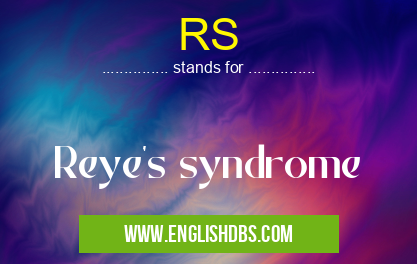What does RS mean in MEDICAL PHYSICS
RS stands for Reye's syndrome, a rare but serious condition that primarily affects children and teenagers. It is characterized by inflammation and swelling of the brain and liver.

RS meaning in Medical Physics in Medical
RS mostly used in an acronym Medical Physics in Category Medical that means Reye's syndrome
Shorthand: RS,
Full Form: Reye's syndrome
For more information of "Reye's syndrome", see the section below.
Causes of RS
The exact cause of RS is unknown, but it is typically triggered by a viral infection, such as the flu or chickenpox. Aspirin, a common pain reliever, is thought to increase the risk of developing RS when taken during a viral infection.
Symptoms of RS
- Nausea and vomiting
- Loss of appetite
- Lethargy and fatigue
- Headache
- Confusion and disorientation
- Seizures
- Liver failure (in severe cases)
Diagnosis of RS
Diagnosing RS can be challenging as the symptoms are similar to those of other conditions. Blood tests, a liver biopsy, and a spinal tap may be used to confirm the diagnosis.
Treatment of RS
There is no cure for RS, but treatment focuses on managing the symptoms and preventing complications. This may involve:
- Intravenous fluids to prevent dehydration
- Anticonvulsants to control seizures
- Liver transplant in severe cases of liver failure
- Supportive care to maintain vital functions
Prevention of RS
The best way to prevent RS is to avoid aspirin or aspirin-containing products in children and teenagers with a viral infection. Other preventive measures include:
- Vaccinating children against the flu and chickenpox
- Avoiding alcohol and illicit drug use during pregnancy
- Maintaining a healthy lifestyle and diet
Essential Questions and Answers on Reye's syndrome in "MEDICAL»MEDPHY"
What is Reye's syndrome (RS)?
Reye's syndrome is a rare but potentially fatal condition that affects the brain and liver. It primarily affects children and adolescents and is often associated with the use of aspirin during a viral illness.
What are the symptoms of Reye's syndrome?
Symptoms of Reye's syndrome typically develop within a few days of a viral infection, such as the flu or chickenpox. They include vomiting, lethargy, confusion, seizures, and coma. Liver damage can also occur, leading to jaundice and abdominal pain.
What causes Reye's syndrome?
The exact cause of Reye's syndrome is unknown, but it is believed to be triggered by the use of aspirin during a viral infection. Aspirin can interfere with the body's metabolism, leading to a buildup of toxic substances that can damage the brain and liver.
How is Reye's syndrome treated?
There is no specific cure for Reye's syndrome. Treatment focuses on supportive care, including measures to reduce brain swelling, control seizures, and support liver function. In severe cases, a liver transplant may be necessary.
Can Reye's syndrome be prevented?
The most effective way to prevent Reye's syndrome is to avoid giving aspirin to children and adolescents during a viral illness. Other pain relievers, such as ibuprofen or acetaminophen, can be used instead.
Final Words: RS is a serious condition that can have life-threatening consequences. Early diagnosis and treatment are crucial for improving outcomes. Parents and caregivers should be aware of the risks associated with aspirin use in children and teenagers during viral infections. By taking preventive measures and seeking medical attention promptly, the risk of developing RS can be minimized.
RS also stands for: |
|
| All stands for RS |
